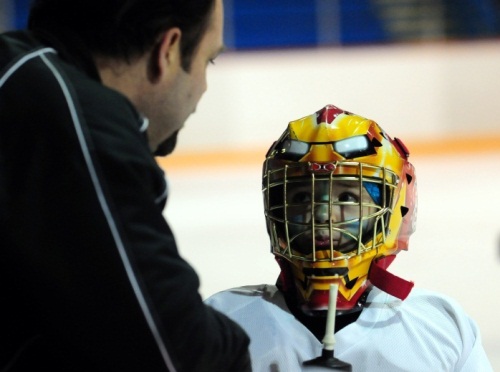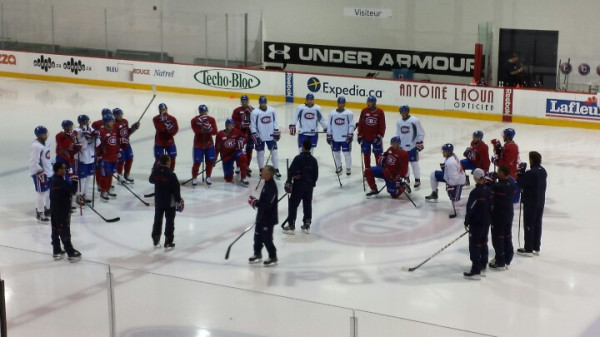by Habsterix, Senior Writer, AllHabs.net
At the end of the game, at the end of practice, look yourself in the eyes in a mirror and ask: “Did I give my best effort?” If you feel like you could have given more at any point, your coaches and parents are in a position to expect more. If you can honestly answer yes, you have left everything on the ice, the coaches will be happy no matter the results as no one can expect more than your best effort.
PENTICTON, BC. — In Canada, we live in a hockey society. We breathe a culture which includes freezing our feet in cold hockey arenas, getting up for a 6:00 a.m. practice, travelling on snow covered roads for games and tournaments. Sometimes we, as parents, feel like we’ve made all the sacrifices and we have the right to act the way we want. As minor hockey season is once again upon us, it may be the only hockey we get to watch for some time due to a pending NHL lockout.
Often forgotten in our hockey stories are volunteers who help shape our young men and young women, by teaching and helping them develop not only their hockey skills, but life-long lessons which they will carry with them for the rest of their lives: the hockey coaches. Forgotten by the parents that is, but never by the kids themselves, as we often hear pro players give credit to some of their minor hockey coaches in public. Those people who have to spend their own time and money to be certified in order to be behind the bench to ensure that our kids get the best advice and direction possible.
I’m not different as I often think of my Peewee coach, who has taught me that when he picked his teams, he wasn’t necessarily picking the most talented players. He was rather focussed on the players who would attempt to do what he was asking them to do and the ones who gave the best effort. That coach, who I played beer league hockey with some 15-20 years later, told me that he has missed the finals only three times.
While parents drive their son or daughter to the rink for a practice, the coach is often already there with the equipment, and checking out the dressing room for debris or hazards. He or she has already spent a lot of time planning the practice, deciding on what kind of warm-up and drills they will be working on that day. Depending on the age group, they may tie the skates of several players to ensure that they’re ready on time, even helping the goalie strapping on the pads.
During practice, they try to keep 15-20 kids moving, learning, focussing on the task, cheering them on, and pushing them at improving on their individual and team skills. After practice, they ensure that every parent has picked up their child, sometimes driving some back home. An hour practice represents anywhere from two to three hours of “work” for the coach. And that routine happens for every single practice.
Before each game, the coach will draw his line-up, while ensuring that every player has a ride to get to the game and back. He/she will ensure that the equipment will be there, and that the coaching staff is on the same page for the game plan. The coach will be the team’s motivator in the pre-game speech, ensuring that every player is ready to play as hard as they can. He/she will juggle with lines depending on game situations, penalties or injuries, while trying to keep everyone happy.
Coaching also means taking mental notes during the game of areas where individual players or the team as a whole needs to work on at upcoming practices. When it’s all said and done, win or lose, the coach will be in the dressing room to give the players a recap of the game, by pointing out some areas of concerns but mostly, to give them encouragement for what they have done well.
Yes, like with anything else in life, there are some better coaches than others and no, I don’t know where I will fit in where it’s all said and done. As a coach, you have to keep an open mind and be like a sponge in absorbing the experience. But the worst kind of Minor Hockey coach is, in my opinion, like the worst parent or the worst director: he or she who is in it for their child only, or for other personal gains.
Here are, in my own humble opinion, the best qualities of a hockey coach:
- Fair: Playing every player no matter their level of play. Minor hockey is not about winning, it’s about player development. We there for every single kid on the team.
- Instructive: Being there to develop young individuals equally, based on each player’s individual skills set.
- Respectful: Will respect the coaching staff, the players, the parents, the equipment, the referees, the opposing team.
- Role model: Sometimes, tempers will boil. Remembering that our actions as coaches will often be imitated by our young players. Staying calm in all situations is key.
- Organised: At the cost of ice these days, having the kids moving at all time in practices by being well prepared is very important. Less talking, more action.
- Communicator: Have parents meeting to start the season with expectations and your coaching philosophy laid out, regular players meetings
- Flexible: Be ready and willing to adapt and change depending on situations
- Firm and assertive: The coach is a decision maker, even when those decisions are not easy to make
- Accountable: Coaches like taking credit when things go well, they must recognize when they make decisions that didn’t pan out.
Now that you know what to expect from your coach and hopefully, gain some added insight on the responsibilities put upon them, let’s look at the at the role of parents which can be challenging for coaches. While most parents are excellent to deal with, it only takes a few bad ones on a team to make coaching a nightmare.
Here are some of the parents’ responsibilities:
- Cheer the team: We’ve all seen the parents who only cheer when their son or daughter touches the puck. While armless and somewhat innocent, it raises the question if the player is getting the full experience of team concept when parents only have eyes for them.
- Let the coaches do the coaching: More often than not, the coaching staff has a game plan for your child and for the team. They are implementing something based on consistency. By over-coaching your child, you may plant doubts which will be detrimental to everyone involved.
- Be respectful: Whether it’s in the stands or at home, show your kids and everyone around the game respect. Instead of yelling at the young referee for a missed call, understand that he too is learning that that he will be making mistakes. Acknowledge the mistake but move on. No need to be nasty about it.
- Be supportive: You may use constructive criticism with your child from time to time but always apply the 2-for-1 rule: for each negative comment, always have two positive statements for it, and always finish with the positive. Remember: hockey for your child must be fun for him/her to enjoy it.
- Report concerns to the coaches: Don’t spread unhappiness with other parents. Let your coaches know your concerns in person, one on one at the appropriate time. There might be a simple solution.
- Don’t be THAT parent: Your child is not in the NHL or on Team Canada. Don’t act like he/she will be your pride and joy if he/she succeeds. You should be proud of them no matter what, right now.
I’d invite you to have a look at this video. Please excuse the acting and the production quality and try to focus on the message.
I remember, a few years ago, sitting in the stands watching one of my daughters’ ringette practices. A group of parents were complaining about the drills, about the fact that they were spending too much time standing still and not enough time skating. It seemed like everything that the coach did was wrong and while deep down inside, I agreed with some of their comments, I felt like I had to step in. I acknowledged that perhaps, there were things that could be improved upon but to be fair, I did not put my name forward to take that difficult position, back when they were looking for people, and that I felt that it was generous of those two ladies to have volunteered the way they have. I could feel the sense of guilt in the stands as the group of parents recognized that what they were doing was not right.
My wife blessed me with two beautiful daughters and I’ve coached them both at least one sport. I even started a female hockey program for our local Minor Hockey Association with whom I was a Director for the first three years. There is one lesson that I’ve shared with every team that I’ve coached so far and it’s one about rewarding effort over results.
Very early in the season, I like sharing the mirror analogy with my players. I tell them that after each game or practice, they should look at themselves straight in the eyes in a mirror and question if they have given their best effort. I tell them that I don’t want to know their answer, but I want them to answer within themselves.
If they feel that yes, they gave it their best, no one can expect more and that, no matter what the outcome of the game was. But if they acknowledge deep down that they could have done more, they can expect their coaches or parents to expect more from them.
I come back with that analogy regularly during the season, in positive and not so positive situations. At the end of the season last year, I spoke in front of the team and the parents at our windup. I had bought them some magnetic mirrors for their school locker and on the frame, I put the note, with the team logo: “Did I give my best effort?” When handing them the mirrors, I explained that this does not apply only to hockey, but that it’s a philosophy that they should apply to everything in their life, including school. If they get a C on an exam and that they look themselves in the mirror and answer yes, their parents and teachers can’t expect more.
The goal of this piece is to remind us that while we do make a lot of sacrifices, it could be much worse if we didn’t have those coaches volunteering their time and money for the kids. How can you help them? Help by taking a small responsibility. Be a manager, offer to be in charge of the equipment, look after booking tournaments with hotel rooms and mostly, ensure that your child has a positive attitude, arrives on time and teach them commitment. A simple thank you or word of encouragement also goes a long way during or after a long season.
I will be coaching again this season and I will give my best effort. I wouldn’t change it for anything in the world.









![Prospect Report: Habs Development Camp Testing [GALLERY]](https://habshockeyreport.com/wp-content/uploads/2014/07/IMG_2897.jpg)

![Habs Western Road Trip in Pictures [GALLERY]](https://habshockeyreport.com/wp-content/uploads/2014/03/476898185_slide.jpg)